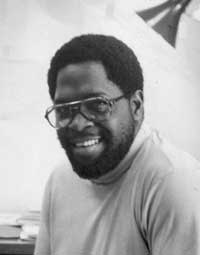It all started with a simple question. Nearly 24 years ago, two women from Denver wanted to know why the city of Portland didn't have a street named for Martin Luther King Jr.
Bernie Foster, publisher of The Skanner News, didn't know what to tell the two ladies, whose names have been long forgotten.
"So, we put a flier in the paper and ran it for a couple of weeks," he said.
Along with several volunteers from the community, The Skanner's call for action drew in about 4,000 signatures in support of a plan to rename a street in Portland after Martin Luther King Jr.
 |
The late William Little of Portland State University |
This year marks the 35th anniversary for The Skanner News Group, which published its first edition in October 1975. Over the decades, The Skanner News has operated like few other papers – with a mission statement: "Challenging People to Shape a Better Future Now."
This mission accompanies the many projects the newspaper's owners and staff have undertaken. One of the most visible and ambitious was the renaming of Union Avenue to Martin Luther King Jr. Boulevard that took place from the fall of 1986 to May of 1989.
But like other challenges faced by The Skanner, honoring Martin Luther King Jr. was no easy task. In many ways, the struggle by a group of dedicated citizens mirrored the attempt to name a Portland street after Hispanic civil rights icon Cesar Chavez.
In autumn of 1986, the city had no mechanism to rename a street. So when The Skanner Newspaper presented the city with a petition to rename a street in honor of King, they created one. And Foster helped created an all-star committee to make it happen.
"We picked people for their expertise," he said.
 He went to Carolyn Leonard (pictured at left) and the late William Little (pictured above), of Portland State University to head the committee. Others were picked for their skills and connections to the community, including Trail Blazers President Harry Glickman, Rev. John Jackson, Neil Kelly, Attorney Monica Little (pictured below), and others.
He went to Carolyn Leonard (pictured at left) and the late William Little (pictured above), of Portland State University to head the committee. Others were picked for their skills and connections to the community, including Trail Blazers President Harry Glickman, Rev. John Jackson, Neil Kelly, Attorney Monica Little (pictured below), and others.
Committee member Kathleen Sadaat, who was working as Gov. Neil Goldschmidt's director of affirmative action, said the street project was about more than symbolism, it was acknowledging the shared history between races.
"The concrete manifestation of his greatness was not looked at as a positive thing by some people," Sadaat said. "There was a lot of hostility around the name change. People felt like history was being stolen."
Leonard, who worked as Portland Public Schools' coordinator for multicultural/multiethnic education, says objections were raised to the project nearly as soon as they would recommend a street to rename.
Fifth Avenue wouldn't work. The bankers and businessmen saw to that.
Front Avenue was out of the question. Citizens said it carried too much history behind it. It was later renamed Naito Parkway, after developer Bill Naito, with little objection.
 And Union Avenue – named in honor of the Union's victory over the South? Most businesses objected to changing the name. Even some African Americans said it was a bad idea. At the time, the strip was in disrepair and was not considered to be a good part of town.
And Union Avenue – named in honor of the Union's victory over the South? Most businesses objected to changing the name. Even some African Americans said it was a bad idea. At the time, the strip was in disrepair and was not considered to be a good part of town.
But the committee had done several things right. They were all well-connected, educated people; they had the support of city hall; and they followed the city's newly created street renaming guidelines.
 Foster says Union Avenue was also a perfect choice because it was visible.
Foster says Union Avenue was also a perfect choice because it was visible.
"It was one of the biggest arterial streets in the city," he said. "Every state map would have it."
Interstate 5 would have large signs for the off-ramp, and the Oregon Convention Center being proposed, would have an address with the civil rights leader's name right on it.
Rep. Earl Blumenauer, D-Portland, was a newly elected city commissioner in charge of public works at the time. He says he and others worked very hard to get the council and Mayor Bud Clark to unanimously support the proposal. He still doesn't think Clark gets the recognition he deserves for his support of the plan.
Community meetings about the proposal were contentious, with large showings of support and opposition for the idea.
 "You didn't have to scratch the surface very deeply to see the hostility and continued racism," Blumenauer told The Skanner News. "It was a window into Portland's struggle to come to grips with a past that wasn't very savory."
"You didn't have to scratch the surface very deeply to see the hostility and continued racism," Blumenauer told The Skanner News. "It was a window into Portland's struggle to come to grips with a past that wasn't very savory."
The present time wasn't very savory for many of the main proponents of the renaming, either. Foster got numerous threats and someone twice broke the window of The Skanner News office; Leonard said she felt a sense of danger, always looking under her car and making sure no one was following her when she would make solo trips to Salem.
Foster said they had an organized public relations campaign, even going to the length of putting only female African Americans on television.
"No Black males should be on camera, especially if they were real dark, big lips, look like soldiers, warriors," he said. "So we give 'em all the ladies … nice, non-confrontational. We had Carolyn Leonard and Monica Little."
As soon as Union Avenue became the most likely choice for the renaming, businesses formed Citizens for Union Avenue. Foster said he printed the names of businesses that donated money to the cause. Of the 848 surveys sent to tenants and businesses on Union, only 286 were returned. Only 42 supported the change.
Businesses warned they might go belly up having to print new stationary, despite a city rule that left Union Avenue signs up 5 years following a street name change.
But with enough public support and coordination in city hall, business opposition didn't matter.
And another thing happened, according to Foster. One of the main opposition parties – the Barretts – had allegedly invited Klan icon David Duke to dinner to discuss the opposition's tactics.
"That really changed a lot of people's minds," he said.
A TV news crew came to interview Foster about that and asked him 'do you think the Barrett's are racist?"
"In those days, one thing a Black male couldn't do was go on TV and say 'yeah,'" Foster said. "So I said, 'Racist? I don't know if they're racist or not, I think Oregonians can solve their own problems. We just have a difference of opinion.' Hell yeah they were racist, but I couldn't say it."
After the council voted unanimously on April 27, 1989 to support the name change, one manufacturing business on Ainsworth and Martin Luther King Jr. Boulevard decided to take drastic action.
"He was so incensed that he changed the address of his building to that of the side street," Blumenauer said. "This was a respected business person. I will believe to my dying day that it was because of racism."
The opposition decided to take the case to court. Leonard said the case hinged on whether or not the city council had the authority to change the street's name. William Little's wife, attorney and committee member Monica Little helped formulate the proponent's case. In the end, the Oregon Supreme Court ruled in favor of the city.
Foster said there were other big players watching the case at the time. He said he received the full backing of a firm that was worried about losing a $20 million government contract should the case lose, because it would have affected the decision-making powers of nearly every municipality in the state.
Blumenauer credits the committee with their professionalism and dedication for getting the job done right, but says following the city's criteria for street renaming was essential – a process not followed in the Portland Boulevard/Rosa Parks Way and the Cesar Chavez Way campaigns.
Carolyn Leonard says that although the Union discussions were difficult, never did she feel as sickened by those meetings as she did when hearing the opposition to Cesar Chavez Way renaming.
In the end, the renaming of Union Avenue was more than symbolism. Blumenauer said it gave the community an extra incentive to revitalize the troubled area.
Sadaat said it's a way different way to teach children our collective history.
"One day, some kid is going to say, who was Martin Luther King?" she said.
In the end, the ordeal personally cost Foster $11,000. It was money well spent, he said.














































































































































































































































































































